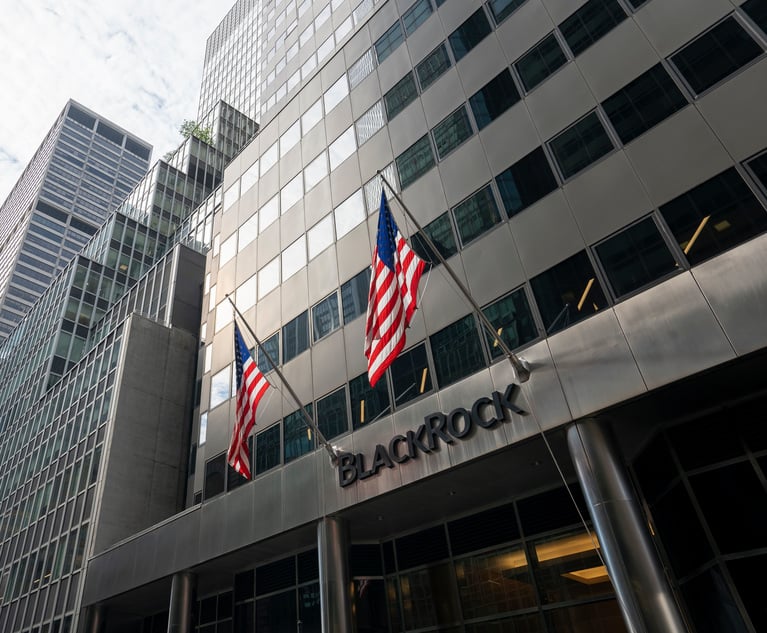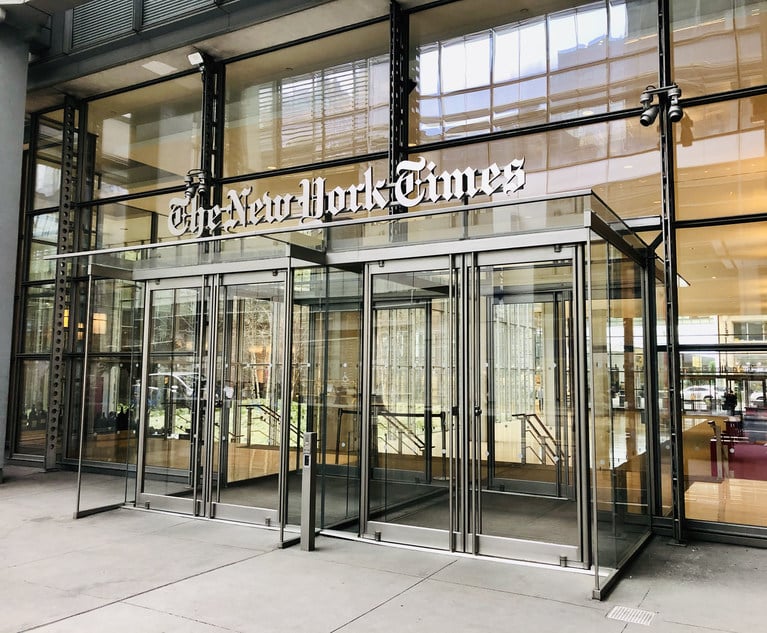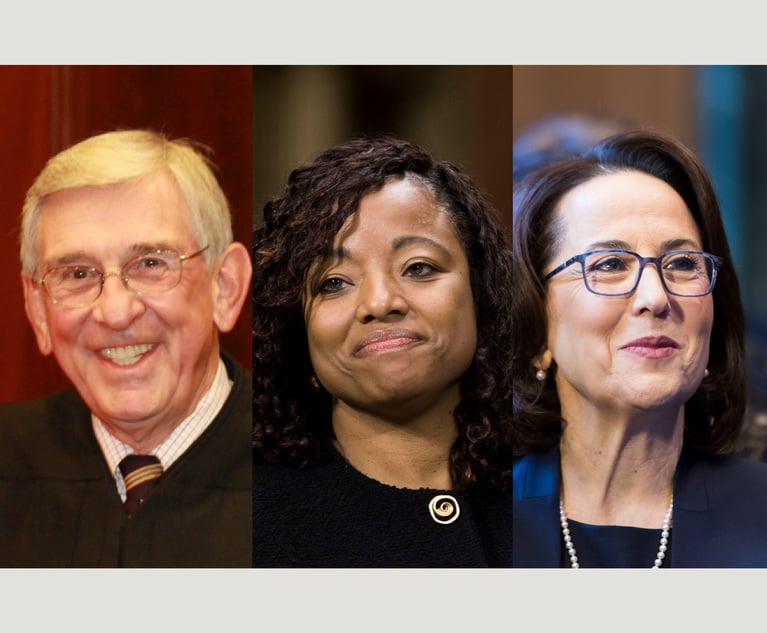DC Circuit Ruling Fuels Class Action Against HHS Abortion Policy for Immigrant Minors
The D.C. Circuit's blockbuster ruling that allowed an undocumented immigrant to leave federal custody to have an abortion marked the court's rare foray into hot-button social issues. It's an open question just how far-reaching the ruling will be either to the underlying purported class of pregnant undocumented minors or to immigration litigation at large. Judge Brett Kavanaugh, writing in dissent, said any precedential value of the court's decision will be debated.
October 26, 2017 at 01:11 PM
12 minute read
 Patricia Millett. Photo credit: Diego M. Radzinschi/ ALM
Patricia Millett. Photo credit: Diego M. Radzinschi/ ALM
The weeks-long court fight over the Trump administration's refusal to allow a detained immigrant teenager from seeking an abortion ended soon after a federal appeals panel ruled for her Tuesday. The court's decision to allow the 17-year-old girl to travel to an abortion facility in Texas now could benefit a wider challenge that is unfolding in Washington's federal trial court.
The American Civil Liberties Union on Oct. 18 sought class certification on behalf of female immigrants similarly situated to the “Jane Doe” teenager who prevailed in the U.S. Court of Appeals for the D.C. Circuit. The full court overturned a panel decision, issued late last week, that blocked the girl from immediately being able to leave federal custody to have an abortion.
The lawyers who brought the case, Garza v. Hargan, said they expected the D.C. Circuit decision will have wider implications for the benefit of the purported class of unaccompanied pregnant minors who are or will be in federal detention. They are challenging revised policy that they claim erected barriers to undocumented minors who want to have an abortion.
“We'll try to get the government policy blocked for all immigrant minors,” said Brigitte Amiri, senior staff attorney at the ACLU's Reproductive Freedom Project. The challengers said in court papers that government records suggest that every year “there are hundreds” of pregnant immigrant minors in federal custody.
But it's an open question just how far-reaching the D.C. Circuit's ruling will be either to the underlying purported class action or to immigration litigation at large.
D.C. Circuit Judge Brett Kavanaugh, who voted against allowing the girl immediate access to an abortion facility, teed up his doubts in a footnote this week that questioned any precedential value of the ruling. The majority on the court, he noted, said only that it “substantially” agreed with Judge Patricia Millett, who last week voted against the government's effort to delay or otherwise deny the girl access to an abortion center.
 Judge Brett Kavanaugh. Photo credit: Diego M. Radzinschi/ ALM
Judge Brett Kavanaugh. Photo credit: Diego M. Radzinschi/ ALM “The majority's decision rules against the government 'substantially for the reasons set forth in' the panel dissent. Given this ambiguity, the precedential value of this order for future cases will be debated,” Kavanaugh wrote. “But for present purposes, we have no choice but to assume that the majority agrees with and adopts the main reasoning for the panel dissent.”
The D.C. Circuit's unsigned order Tuesday rejected a divided panel ruling that would have delayed the teen's abortion until Oct. 31 in order to give the government time to find a sponsor for her. A sponsor, according to the government, would have allowed the teen to leave detention and presumably assist her in having an abortion.
Writing in her dissent last week, Millett said the Supreme Court's decisions in Planned Parenthood of Southeastern Pennsylvania v. Casey and Whole Woman's Health v. Hellerstedt made clear that the government could not stand in the way of the teenage girl's effort to have an abortion.
In her concurring opinion Tuesday, Millett skewered “big government” for interfering with the minor's rights. “The government's mere hope that an unaccompanied, abused child would make the problem go away for it by either (i) surrendering all of her legal rights and leaving the United States, or (ii) finding a sponsor the government itself could never find is not a remotely constitutionally sufficient reason for depriving J.D. of any control over this most intimate and life-altering decision,” she wrote.
Millett wrote: “Surely the mere act of entry into the United States without documentation does not mean that an immigrant's body is no longer her or his own. Nor can the sanction for unlawful entry be forcing a child to have a baby. The bedrock protections of the Fifth Amendment's due process clause cannot be that shallow.”
The D.C. Circuit's 6-3 decision is binding precedent in the D.C. Circuit. Other federal appellate courts may look to the order when facing similar issues, but the ruling does not dictate how other cases outside the D.C. Circuit should be resolved.
“I think those in the majority will treat it that way,” Erwin Chemerinsky, dean of the University of California Berkeley School of Law, said. “The government may not give up, but I think the D.C. Circuit will adhere to this position unless the Supreme Court decides otherwise.”
Steven Aden, chief legal officer and general counsel to Americans United for Life, predicted the D.C. Circuit ruling will have “minimal” precedential value.
“I do believe this is an issue that needs to be settled by the Supreme Court and I hope it will be,” Aden said. “The question is whether public funds and public officials are required to facilitate the elective abortion of a person in their custody.”
The lawyers representing the class action, Aden said, now have a “basic read” on how a majority of the D.C. Circuit would rule on that issue. “But I think the issue will continue to come up in other courts and, in an appropriate case, we'll find out if the Supreme Court is interested,” he said.
Read more:
 Patricia Millett. Photo credit: Diego M. Radzinschi/ ALM
Patricia Millett. Photo credit: Diego M. Radzinschi/ ALM
The weeks-long court fight over the Trump administration's refusal to allow a detained immigrant teenager from seeking an abortion ended soon after a federal appeals panel ruled for her Tuesday. The court's decision to allow the 17-year-old girl to travel to an abortion facility in Texas now could benefit a wider challenge that is unfolding in Washington's federal trial court.
The American Civil Liberties Union on Oct. 18 sought class certification on behalf of female immigrants similarly situated to the “Jane Doe” teenager who prevailed in the U.S. Court of Appeals for the D.C. Circuit. The full court overturned a panel decision, issued late last week, that blocked the girl from immediately being able to leave federal custody to have an abortion.
The lawyers who brought the case, Garza v. Hargan, said they expected the D.C. Circuit decision will have wider implications for the benefit of the purported class of unaccompanied pregnant minors who are or will be in federal detention. They are challenging revised policy that they claim erected barriers to undocumented minors who want to have an abortion.
“We'll try to get the government policy blocked for all immigrant minors,” said Brigitte Amiri, senior staff attorney at the ACLU's Reproductive Freedom Project. The challengers said in court papers that government records suggest that every year “there are hundreds” of pregnant immigrant minors in federal custody.
But it's an open question just how far-reaching the D.C. Circuit's ruling will be either to the underlying purported class action or to immigration litigation at large.
D.C. Circuit Judge Brett Kavanaugh, who voted against allowing the girl immediate access to an abortion facility, teed up his doubts in a footnote this week that questioned any precedential value of the ruling. The majority on the court, he noted, said only that it “substantially” agreed with Judge Patricia Millett, who last week voted against the government's effort to delay or otherwise deny the girl access to an abortion center.
This content has been archived. It is available through our partners, LexisNexis® and Bloomberg Law.
To view this content, please continue to their sites.
Not a Lexis Subscriber?
Subscribe Now
Not a Bloomberg Law Subscriber?
Subscribe Now
NOT FOR REPRINT
© 2025 ALM Global, LLC, All Rights Reserved. Request academic re-use from www.copyright.com. All other uses, submit a request to [email protected]. For more information visit Asset & Logo Licensing.
You Might Like
View All
US Courts Announce Closures in Observance of Jimmy Carter National Mourning Day
2 minute read
Who Got the Work: Gibson Dunn and Wilmer to Defend BlackRock in ESG Antitrust Lawsuit
2 minute read
New York Times Moves for $100K in Attorney Fees Against Dfinity Foundation
3 minute read
Split 4th Circuit Revives Constitutional Challenge to Child Vaccine Mandate
Trending Stories
- 1Restoring Trust in the Courts Starts in New York
- 2'Pull Back the Curtain': Ex-NFL Players Seek Discovery in Lawsuit Over League's Disability Plan
- 3Tensions Run High at Final Hearing Before Manhattan Congestion Pricing Takes Effect
- 4Improper Removal to Fed. Court Leads to $100K Bill for Blue Cross Blue Shield
- 5Michael Halpern, Beloved Key West Attorney, Dies at 72
Who Got The Work
Michael G. Bongiorno, Andrew Scott Dulberg and Elizabeth E. Driscoll from Wilmer Cutler Pickering Hale and Dorr have stepped in to represent Symbotic Inc., an A.I.-enabled technology platform that focuses on increasing supply chain efficiency, and other defendants in a pending shareholder derivative lawsuit. The case, filed Oct. 2 in Massachusetts District Court by the Brown Law Firm on behalf of Stephen Austen, accuses certain officers and directors of misleading investors in regard to Symbotic's potential for margin growth by failing to disclose that the company was not equipped to timely deploy its systems or manage expenses through project delays. The case, assigned to U.S. District Judge Nathaniel M. Gorton, is 1:24-cv-12522, Austen v. Cohen et al.
Who Got The Work
Edmund Polubinski and Marie Killmond of Davis Polk & Wardwell have entered appearances for data platform software development company MongoDB and other defendants in a pending shareholder derivative lawsuit. The action, filed Oct. 7 in New York Southern District Court by the Brown Law Firm, accuses the company's directors and/or officers of falsely expressing confidence in the company’s restructuring of its sales incentive plan and downplaying the severity of decreases in its upfront commitments. The case is 1:24-cv-07594, Roy v. Ittycheria et al.
Who Got The Work
Amy O. Bruchs and Kurt F. Ellison of Michael Best & Friedrich have entered appearances for Epic Systems Corp. in a pending employment discrimination lawsuit. The suit was filed Sept. 7 in Wisconsin Western District Court by Levine Eisberner LLC and Siri & Glimstad on behalf of a project manager who claims that he was wrongfully terminated after applying for a religious exemption to the defendant's COVID-19 vaccine mandate. The case, assigned to U.S. Magistrate Judge Anita Marie Boor, is 3:24-cv-00630, Secker, Nathan v. Epic Systems Corporation.
Who Got The Work
David X. Sullivan, Thomas J. Finn and Gregory A. Hall from McCarter & English have entered appearances for Sunrun Installation Services in a pending civil rights lawsuit. The complaint was filed Sept. 4 in Connecticut District Court by attorney Robert M. Berke on behalf of former employee George Edward Steins, who was arrested and charged with employing an unregistered home improvement salesperson. The complaint alleges that had Sunrun informed the Connecticut Department of Consumer Protection that the plaintiff's employment had ended in 2017 and that he no longer held Sunrun's home improvement contractor license, he would not have been hit with charges, which were dismissed in May 2024. The case, assigned to U.S. District Judge Jeffrey A. Meyer, is 3:24-cv-01423, Steins v. Sunrun, Inc. et al.
Who Got The Work
Greenberg Traurig shareholder Joshua L. Raskin has entered an appearance for boohoo.com UK Ltd. in a pending patent infringement lawsuit. The suit, filed Sept. 3 in Texas Eastern District Court by Rozier Hardt McDonough on behalf of Alto Dynamics, asserts five patents related to an online shopping platform. The case, assigned to U.S. District Judge Rodney Gilstrap, is 2:24-cv-00719, Alto Dynamics, LLC v. boohoo.com UK Limited.
Featured Firms
Law Offices of Gary Martin Hays & Associates, P.C.
(470) 294-1674
Law Offices of Mark E. Salomone
(857) 444-6468
Smith & Hassler
(713) 739-1250










